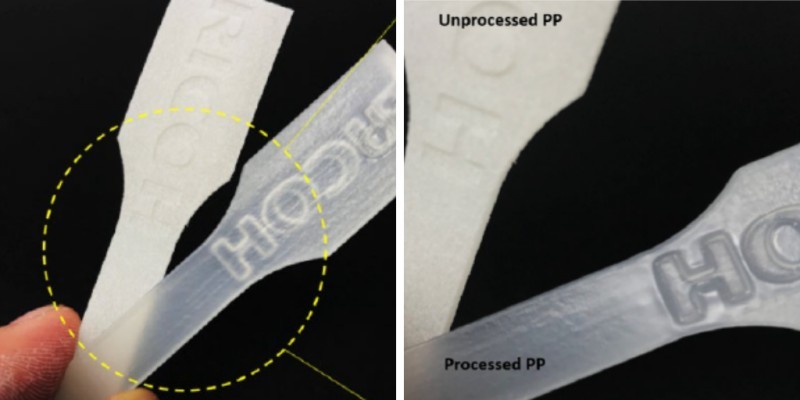Two additive manufacturing businesses are working together to enhance the aesthetic quality of polypropylene 3D printed parts and deliver an injection moulded-like finish, a new white paper has revealed.
The collaboration between Ricoh 3D and Additive Manufacturing Technologies (AMT) will allow polypropylene to be used in a greater number of industries thanks to new smoothing innovations.
The research highlights the success of the newly developed solution, which is a modified version of AMT’s existing PostPro3D technology, for polypropylene 3D printed parts. Results include dramatic improvements to both mechanical and surface characteristics when the smoothing process was used on parts 3D printed in Ricoh’s sought-after pp material.
Ricoh’s laser sintered 3D parts were used for the evaluation testing, with AMT developing its smoothing process to improve the quality of the parts and reduce production lead times and costs.
Medical standards require that certain drug delivery devices or parts in contact with the human body must have a smooth finish, to prevent the growth of micro-organisms on the part surface. Polypropylene is a particularly versatile material with its lightweight, flexible and watertight properties, but its use was restricted in certain applications due to its grainy surface finish.

All that is set to change though, with AMT’s innovative smoothing process leaving surfaces with an injection moulded-like quality. Testing reported that surface roughness of the processed parts decreased significantly with a reduction of around 95 per cent, creating a highly aesthetic visual appearance.
From a mechanical perspective, the average elongation at break for processed parts was up to four times that of unprocessed parts.
Ricoh sees such developments as key to the future growth of polypropylene as an additive manufacturing material, and plan to test with AMT for regulations in medical and food contact applications in the next phase of research.
The full white paper can be found here.
Mark Dickin, Additive Manufacturing and Moulding Engineering Manager at Ricoh 3D, said: “We believe this is a huge step forward for our polypropylene material as it opens up new opportunities for its use in a wide range of industries and end use applications where a smooth surface is critical.
“Our polypropylene is extremely popular as it is fatigue-resistant, durable and chemically resistant, which makes it comparable to the end part.
“Whatever the shape and size, we are now in a position to offer consistent smoothing of the whole part. Other technologies, such as vibro-smoothing, can only smooth the outer surfaces of the part.
“From an aesthetic, surface roughness and performance perspective, we have seen significantly improved results from AMT’s newly developed patent pending smoothing process – and with no detrimental effects on other properties, such as tensile strengths and tensile modulus.”

AMT’s smoothing technology is a process that delivers surface engineering for polymers, eliminating surface imperfections of parts including complex geometries with internal cavities and other non-visible internal structure.
Giorgio Ioannides, Business Development Manager at Additive Manufacturing Technologies, said “AMT regards Polypropylene for Powder Bed Fusion technologies as a key material for the growth of additive manufacturing, which inspired our research into an innovative new process for smoothing. Ricoh’s versatile translucent off-white polypropylene material is one of the most commonly used polymers in the manufacturing industry. Our process has shown that it is possible to dramatically improve the mechanical performance and surface characteristics of parts, which is a really exciting development for the industry.”
Ricoh 3D is a true end-to-end manufacturer, taking products through their full development cycle – whether it’s one or one million parts. For more information, visit our About Us page and get an instant 3d printing quote today.
About Ricoh
Ricoh 3D is empowering digital workplaces using innovative technologies and services enabling individuals to work smarter. For more than 80 years, Ricoh has been driving innovation and is a leading provider of document management solutions, IT services, communications services, commercial and industrial printing, digital cameras, and industrial systems.
Headquartered in Tokyo, Ricoh Group operates in approximately 200 countries and regions. In the financial year ended March 2020, Ricoh Group had worldwide sales of 2,008 billion yen (approx. 18.5 billion USD).
About AMT
Founded in 2017, AMT is headquartered in the UK (Sheffield), with global reach through facilities in the USA (Austin, Texas) and mainland Europe (Veszprem, Hungary), as well as collaborative partnerships across the world. AMT’s technology is developed at the intersection of material science, chemistry, hardware engineering, robotics, and machine learning. The vision is to deliver safe, sustainable and economically-favourable, industrialised additive manufacturing solutions that offer real and viable alternatives to traditional manufacturing. For more information go to the AMT website.
